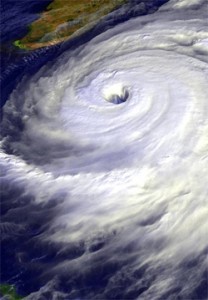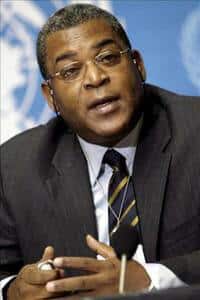 PORT-AU-PRINCE — After hurricane Tomas ripped through Haiti, destroying some 5,000 houses and causing 18 million dollars in new damage, Haiti’s Prime Minister Jean-Max Bellerive announced on behalf of the National Assembly that Haiti will withdraw from its current hurricane season contract.
PORT-AU-PRINCE — After hurricane Tomas ripped through Haiti, destroying some 5,000 houses and causing 18 million dollars in new damage, Haiti’s Prime Minister Jean-Max Bellerive announced on behalf of the National Assembly that Haiti will withdraw from its current hurricane season contract.
“Haiti had high hopes of making the natural disaster playoffs this season, but we’ve had an absolutely insane schedule,” said Bellerive. January’s 7.0-magnitude earthquake killed 250,000 people and left one million homeless.
In October, a cholera epidemic broke out killing hundreds and infecting thousands. The epidemic has yet to reach its peak. Foreign minister Marie Michele Rey supported the National Assembly’s heartbreaking decision. “At a certain point, it just gets unbelievable, and you just have to say, what the tanbou fey? and throw it in,” said Rey.
Puerto Rico’s governor Luis Fortuno was disappointed with Haiti’s decision but expressed understanding. “With Haiti out,” he said, “the remaining islands now have to accept higher winds and greater rain fall.”
Not everyone was as open to Haiti’s withdrawal. Questions of legality remain. Christopher Taylor of the National Oceanic and Atmospheric Administration said Haiti’s move was “unprecedented and clearly illegal.” Taylor acknowledged that Haiti has had a rough year but “a contract is a contract.” NOAA coordinates hurricane seasons years in advance. “At the very least,” said Taylor, “Haiti has to find a substitute to take its place.”
This week, Haiti’s National Assembly did just that. It nominated France to pick up the remainder of its hurricanes for the season. Haiti’s secretary of state Magali Comeau Bayard explained, “by picking up Haiti’s contract, France could work off some of $22 billion dollars it still owes Haiti.” The plan would be for Haiti’s allotment of hurricanes to be redirected to the Aquitane region of France, off the Atlantic coast
Michel Jobert, France’s Minister of Foreign Affairs, declared Haiti’s vote “unfortunate” and explained that the Aquitane region was too delicate an area due to its maize, carrots, strawberries, plums, grapes, oysters, and poultry for foie gras. Haiti’s secretary of state said that he would like some grapes. Jobert added that the thirteen medieval castles in Aquitaine “were a special treasure of France and couldn’t stand up against a category 3 storm any longer.” Jobert strongly recommended that Haiti nominate another former French colony, Gabon, Africa, as its contractual substitute.

Prime Minister Jean-Max Bellerive opts out of Haiti's current hurricane contract.
Ben Jenson of the National Weather Service objected to the problems connected to a Haiti substitute. “Even if Haiti finds a suitable replacement, the logistics are extremely difficult. A good hurricane is an art form.” Jenson said the U.S. Air Force would have to get involved at a high level.
The 2010-2011 hurricane season in the Gulf of Mexico falls under the jurisdictional control of the U.S. Air Force’s High Frequency Active Auroral Research Program (HAARP), Poker Flats, Alaska. HAARP’s Colonel Dennis Pitcher conceded that his office could reroute Haiti’s remaining hurricanes to Aquitane, France, but “Haiti would have to give up something serious in return.” Haiti’s National Assembly continues closed negotiations with HAARP but the sides have yet to reach an agreement.
Postscript: Wouldn’t it be truly amazing if Haiti could simply “opt out” of earthquakes and hurricanes? If the unfortunate ones could simply check a box and never worry about malaria or cholera? But that’s very much not the world we live in and the children of Haiti continue to be hammered by disease and pestilence. One charity that is on the front lines of helping children in Haiti is Heart of God International. They have been able to keep their children safe and disease-free through the generous donations of our readers, the use of the Solar Generator provided by Solutions from Science, and a water filtration system. In fact, during Hurricane Tomas, their compound became a refuge for 50 local people where they were kept safe and given a place to sleep. Through careful planning, they were able to mitigate any diseases, continued to have filtered water, and remained safe. However, the needs are still many as more and more people look to them for help through the calamities besetting this island nation. You can read about their wonderful work and how you can help by clicking here.
Click below to find out how you can donate to Heart Of God International.

 Off The Grid News Better Ideas For Off The Grid Living
Off The Grid News Better Ideas For Off The Grid Living




